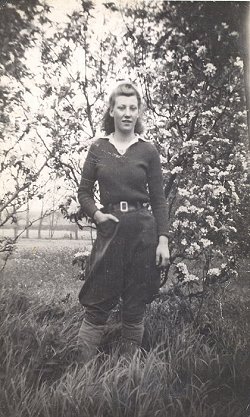Bedfordshire Land Girl Memoir
Bedfordshire Women's Land Army | Land Girl Memoirs
Potton Hostel
Mary Stoke nee Henman
(WLA 118846: 6 May 1943 [one year break in 1945-6] 17 September 1949)
 The
hostel
The
hostel
"Our hostel, The Hollies, was a large house on the main street of Potton, a small town close to Sandy and Biggleswade. It was a rambling house, a few miles from Tempsford Airfield. I was in the top floor room of the house, which had the reputation of being haunted and on a windy night the tree branches outside would brush and tap against the window. I was frightened but I didn't tell my room-mate, Rose Marsh.
The food
Our day started when we were called by our Forewoman, aptly named Bertha Bullock, at 5.30am (before daylight) and we had to get washed, dressed, and prepare our lunch-boxes (heavy aluminium things) for the day. This was, more often than not, Spam or grated cheese (sometimes mouldy). It was surprising the number of people who were under the impression that because we were working on the land, with farmers and market-gardeners, that we were living of the fat of the land, getting loads of 'goodies' denied to the general public. Nothing could be further than the truth! We were on strict rations, like everybody else, with no luxuries on the side. We did not get chicken, meat or eggs.
When people used to say, "Oh, you land girls are doing alright you never go short of food" it really got under my skin. They should have tried the 'onion stew' we regularly got for our main meal during the week, or have to drink the grey-coloured liquid that passed for tea, that we were supplied with ou7r flasks to drink, almost cold, at lunch times. And this after a heavy morning's work in the freezing cold on a snow-covered field.
After our breakfast of porridge and a piece of toast, scraped with margarine, we would start off for our places of work by 7am. The trucks would leave dead on time and if you were late, it was just 'Hard cheese!'. You would be left behind and, as well as gaining a black mark on your record, you were made to do all sorts of jobs around the hostel, such as working on the hostel garden, or that horrible job tidying up the coal shed. I'm afraid that I often missed the trucks, gaining many 'black marks' and black everything else when cleaning out those blasted coal sheds.
Motor transport
Some girls asked if they could be drivers and then were then taught to drive the vans, the enormous lorries and even tractors. For this they were paid extra but they still had to do their other work, on a farm or market garden, besides driving. Our normal pay for 28 shillings with our meals provided and a bar of soap a week, because we had such dirty jobs to do. We had works sheets given to us which had to be signed by the farmer at the end of each day's work.
Fellow land girls
This was the sort of life that I, as a young innocent 17-year old girl had volunteered for in 1941. The other girls in our hostel came from all over the country London, Bedford, Luton, Yorkshire with many coming from up North. There was Pamela 'Bubbles' Ashpole, so nicknamed because she was such a bright bubbly character. Then there were two sisters, Winnie and Elsie. One of them married an airman from the RAF camp at Tempsford. Shirley Richardson married an American soldier, as did Audrey Faver. There were lots of 'Yanks' around in those days [of the war].
Cycling to work
On my second day at the hostel, Bertha Bullock, the Forewoman, a very likeable character, asked, if I could ride a bicycle and of course I said yea. I wasn't quite prepared for the monstrous, cast-iron type of bike they bought out for me to ride. It was heavy just to push, let alone to ride. You could pedal away and get nowhere fast. I was given instructions to go to a farm some mils away, situated on an airfield. There were lot of RAF boys there, to whistle at this timid, 17-year old, riding across their airfield. But worse was to come.
First job on the farm
Reporting to the farm, the first job I as given was to muck out the cowshed. They didn't tell me that a cow had just calved in there, and you can imagine the shock I got as I entered this dark shed, with no light except what was showing through the door as I entered. All I could see was blood and gunge all over the floor. They could see how distressed I was, so they gave that job to someone else. I breather a sigh of relief, but not for long!
The farmer said that he would give me an easier job. "Take those ten cows up to the field by the airstrip. Don't worry, they'll take you they know the way. All you have to do is urge them along and open up the gate for them when you get there, put them in and come back." Nine of the cows must have been listening intently to him, because they behaved just as he said they would, but there hard to be one awkward beast who decided to leave the others and go walkabout on the airfield. One trusted land girl, dozens of laughing airmen and one awkward cow!
Somehow or other, I ushered the nine cows into the field and shut the gate, with my face as red as beetroot. As far as I am aware, the other cow is still wandering the airfield even today. I just don't know what happened to her, but I do know that I as not asked to go back to that farm again.
Market gardening
I was sent to work for a lovely gentleman, a market gardener named George Newman and I ended up working for him and his wife for 2 happy years. Looking back, it was one of the loveliest times of my life. His horticultural business was at 101 Sun Street, Biggleswade. My favourite job was cutting sugar beet. I didn't mind it at all, although I did nearly slice of my thumb one day when trying to sharpen my cutting tools, without waiting for Charlie, one of the older men employed on the farm. The job I most hated was harvesting asparagus a plant I had never ever heard of before but was soon to get to know a lot about, since Mr Newman was a specialist. There were miles and miles of them, popping out of mounds of earth.
Mr Newman had two sons, Bernard and Donald, who were both younger than me. They had no daughters and I must admit that he tended to look upon me as one of the family. I must confess to being spoilt at times. I worked out in the fields with old men but sometimes with young Italian or German prisoners of war. The work was often hard and dirty but we had our laughs.
Yet another market gardener I worked for was Mr Ives. He had rows upon rows of huge greenhouses in which he grew tomatoes. The stains you used to get when working with them were horrible you just couldn't get them off. And those green houses had to be painted and guess who got the job. Certainly not the local painter and decorator. It was the poor old land girls that had to do it. We picked to do some terrible job at times. Especially the tedious or boring ones.
After this I decided to have a break from the Women's Land Army, at the end of the war, and work in a factory, but eventually rejoined, post war and ended up working with land girls based at Leighton Buzzard hostel."
Stuart Antrobus Historian/Author
Page last updated: 10th March 2014

